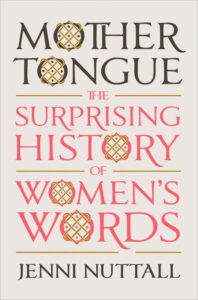
Month-Disease, Flewsa, Lunations: On the Etymology of Periods
Jenni Nuttall Considers the Earliest Written References to Menstruation
Why do our modern words for periods have to be so limited and unappealing? We’re caught between the clinically scientific and the Gothic horror of slang (Code Red, on the rag), with not much more than period left in the middle. Yet it wasn’t always this way. Monthly bleeds had other names for many centuries before the word period appeared on the scene. This chapter tells the story of English’s first words for menstrual bleeding, the physical symptoms which sometimes accompany it and the methods which were used to deal with it. Such language was often more expressive than our bland contemporary terms.
Let’s start at the very beginning, or at least the beginning of written references to menstruation in English. At the end of the sixth century, Pope Gregory I sent missionaries to pagan Britain to convert King Æthelberht and his Kentish subjects to Christianity. Leading the mission was a monk called Augustine, who, having baptized the king and converted ten thousand English men and women, became the first Archbishop of Canterbury. Perhaps paving the way for this mission’s success was Æthelberht’s Christian wife Bertha, a Frankish princess from the continent whose marriage, years before Augustine turned up, was agreed on the understanding that she could keep her faith and have her own bishop close at hand. Gregory had encouraged Bertha to persuade her husband to be baptized. With the conversion achieved, Augustine wrote a letter back to Gregory in Rome asking questions about how to run this new English Church. The Libellus responsionum, “the little book of answers,” is the name of the letter that the pope sent back to him. One of Augustine’s questions concerned whether a menstruating woman should go to church or take communion.
You might think that what a woman could and couldn’t do was none of Augustine or Gregory’s business, but the Book of Leviticus in the Old Testament sets out instructions as to which bodily emissions, whether semen or menstrual blood, rendered a man or woman ‘unclean’ and hence temporarily excluded from religious worship. That Augustine asked Gregory about the matter suggests some debate over whether archaic decrees about ritual purity still applied to Anglo-Saxon Christians. Perhaps forward-thinking sixth-century women like Queen Bertha wanted these questions decided by someone with a hotline to the man at the top in Rome. Answering Augustine, Gregory reassures him that a menstruating woman can indeed go to church because her periods are part of her physical make-up rather than being a sign of sinfulness or impurity. Gregory’s answers were recorded for posterity in the Northumbrian monk Bede’s history of the English Church which he completed in 731. Bede’s Historia was translated into Old English between about 883 and 930, putting Gregory’s Latin, and his word for menstruating, into the written record of the mother tongue. Monað-aðl, the compound chosen by the translator to render Latin menstruus into English, is literally “month-disease,” aðl or adl meaning “sickness” or “ailment.” The word making up the first part of this compound, monað, comes ultimately from moon, a connection left over from measuring time not by months of different lengths making up three hundred and sixty-five days of the solar year, but according to the moon’s changing phases of twenty-nine and a bit days.
I like the fluidity of words like oferflownis, period being too static a word to capture an experience which is, in all senses, liquid, beginning and ending with streaks and spots, flowing heavily and lightly.
Etymologically at least, periods are moon-th-lies as well as month-lies. These moon months were sometimes called lunations, a more elegant word than period. Lunation was indeed briefly used as a polite term for menstruation in an 1822 medical textbook, but it didn’t catch on. Nowadays researchers have disproved any synchronization between the moon’s cycles and the revolutions of our own bodies. Periods run to our own internal clock rather than any public timetable, the endometrium building up and then shedding. Some of us feel the sine waves of our hormones rising and dipping, or track our periods on our phones, rather like astronomers plotting lunar phases. But just as the moon, thanks to my own ignorance of its cycle, often surprises me when I glimpse it late at night or early one morning, full or new, close or far, so I’m often caught unawares by my own body when I lose track of menstrual time.
In giving treatment for periods which are somehow blocked or stoppered, Anglo-Saxon cures recognized that periods are in essence a process of flowing. I like the fluidity of words like oferflownis, period being too static a word to capture an experience which is, in all senses, liquid, beginning and ending with streaks and spots, flowing heavily and lightly. Another Old English word for menstrual bleeding, flewsa, is a relative of the Latin flux, ‘”flowing.” In medieval medicine, a flux is a running-out of liquid from the body, whether semen, blood or the product of illness or disease. The dysentery that killed Henry V and hundreds of his victorious army on campaign in France in 1422 was called the “bloody flux,” a name that makes the grim reality of its blood-filled diarrhea all too plain. Though some fluxes could be fatal, a medieval English translation of a fourteenth-century Latin surgical handbook is careful to say that “alle fluxe of blode” is unnatural and should be treated immediately except for “the mesurable menstrues”: the monthly period. Medieval physicians knew that period blood was to be expected: a flux unlike other much more dangerous bleeding.
I’d rather have a flux than a period, I think. At least nouns like flux and flow can be turned into usable verbs: our bodies flux and flow, discharging like a battery and then recharging. Flux in physics measures the rate at which liquid or matter or energy flows out from or over something. Doc Brown’s flux capacitor in Back to the Future stores energy and releases it in a burst to fire the DeLorean through time. But the word period can’t easily be converted into an action. Nobody says I’m perioding, and I’m menstruating sounds absurdly formal when said out loud. I’m on my period, we hiss under our breath, or, more dramatically, I’m bleeding. The latter is somehow right and wrong: it is undoubtedly blood but not the sort of blood that should panic you, at least once you get used to it.
Words like flux and menstrues arrived in English as barely changed Latin—this is the jargon of academics, doctors and surgeons writing in technical terms. Yet laypeople too were curious about knowledge of all kinds and wanted to read about it in a language they could understand. At the end of the fourteenth century, a priest called John Trevisa translated a kind of medieval Encyclopaedia Britannica with the encouragement of a Gloucestershire nobleman named Thomas, Lord Berkeley for whom Trevisa worked as a private family chaplain. Medieval readers like Thomas (and his daughter Elizabeth, who also commissioned translations) wanted to explore philosophy, medicine, religion and history in their own mother tongue. They also wanted to read about the workings of their own bodies. Prompted by words like flux and superfluitas in his Latin source which describe how the body discharges various bodily fluids, Trevisa calls menstruation “such a rennyng as women have.”
Rennyng is our modern word running: in medieval English menstrual blood ran just as water or paint runs. This feels spot-on to me: to menstruate is to learn the irresistible properties of liquid, its irrepressible flow that soaks and stains. For something that is supposed to be measurable in dinky amounts—teaspoons and eggcups—period blood always seems so plentiful. Those who menstruate are experts in the fluid physics of capillarity and sorptivity, the rates at which fluid moves and absorbs. We divide our menstruating days and nights by what volume of liquid a tampon or a pad can hold for how much time. We worry, perhaps obsessively, about failing in our calculations and leaking over clothes, chairs or bedding. We make menstruating a magic trick, the one where you pour water into a paper bag and then—pouf!—make it vanish. Period blood flows freely yet is hardly ever seen by anyone but us: we take great care to make it invisible.
Such worries can never be put fully aside because period blood is not some universal, predictable constant, so many milliliters per minute, but a rate that varies from hour to hour and from person to person. A medieval guide to gynecology and obstetrics from the beginning of the fifteenth century captures the endless variety: “summe women have it [their period] many dayes and sume but fewe dayes, summe surfetously and summe lytill while and esyly.” Some bleed without much trouble for only a little while, some flow surfetously, excessively. Its author warns off any curious man who might poke his nose into this book and tell its contents to the world. Women who might be in need of the information, he says, have the same bodies and the problems as those pious women who are saints in heaven. He points out that holy women, the most revered in medieval Christianity, saints, martyrs, mystics and even the Virgin Mary herself, suffer these troubles, and so there is no shame to be felt.
Flowing surfetously is nowadays called flooding, menstrual flow so heavy that it soaks quickly through whatever protection you use. For those of us who do have it relatively easy, it can be hard to wrap your mind around just how excessively blood can flow. Until my mid-thirties, I’d no real idea what flooding was: I thought naively it was an exaggeration, a hyperbolic way of describing super-heavy flow. I could manage my periods, so why couldn’t women who flooded manage theirs? How wrong I was.
Once, when my daughter was a toddler at playgroup or in the library—I forget the place but the sensation is stubbornly vivid —I stood up and felt a sudden deluge, blood running fast from some hidden, unknown reservoir. Everything soaked through, knock-kneed and stricken, I shuffled first to the toilets and then, self-consciously, home. Since then, I’ve never underestimated the fluxing, flowing powers of menstruation.
_______________________________________________

From Mother Tongue: The Surprising History of Women’s Words. Used with the permission of the publisher, Viking. Copyright © 2023 by Jenni Nuttall.
Jenni Nuttall
Dr. Jenni Nuttall is an academic who has been teaching and researching medieval literature at the University of Oxford for the last twenty years, and who has thus had a lot of practice at making old words interesting. She has a DPhil from Oxford and completed the University of East Anglia’s MA in creative writing. Mother Tongue is her first book for the general reader.



















